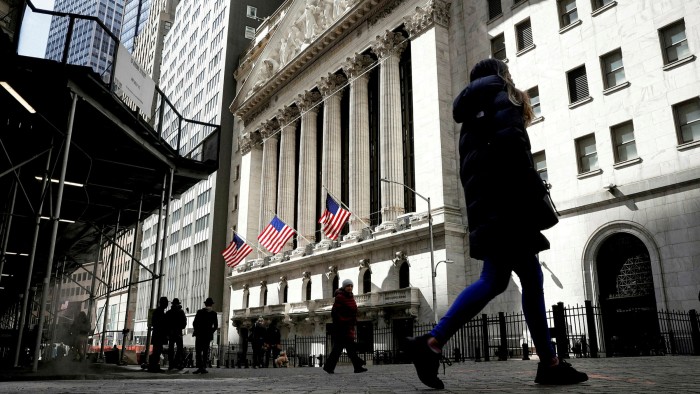Mutual fund and ETF asset growth projected to decline

Simply sign up to the Exchange traded funds myFT Digest -- delivered directly to your inbox.
Interested in ETFs?
Visit our ETF Hub for investor news and education, market updates and analysis and easy-to-use tools to help you select the right ETFs.
Long-term fund assets will grow by 7.4 per cent annually over the next five years, down from 13.1 per cent on average for the five-year period ending this year, ISS Market Intelligence forecasts.
Mutual funds and ETFs will add $11.7tn in assets under management with collective assets growing to $39tn by 2026, the research group estimates.
However, cooler markets will be responsible for a slowdown in annual asset growth, ISS Market Intelligence anticipates. Capital appreciation has been the biggest past driver of asset growth, making up about 70 per cent of the increase in assets over the past five years. But in the next five years, markets are likely to account for just 60 per cent of asset growth.
“With weaker markets, a larger portion of tomorrow’s growth is going to come from flows,” said Christopher Davis, head of US fund research at ISS Market Intelligence. “This is a potential opportunity for managers that have the right distribution and product capabilities, but also a potential danger for managers that have struggled to grow organically.”

This article was previously published by Ignites, a title owned by the FT Group.
Even though more than $1tn has flowed into long-term funds this year, three of the 10 largest fund managers have experienced net outflows, Davis noted.
In the year to the end of November, investors pulled a net $29.7bn from T Rowe Price’s mutual funds and ETFs, $13.1bn from Franklin Templeton’s and $13.9bn from Dimensional Fund Advisors’, according to Morningstar Direct.
“Without the tonic of fast-rising markets, managers will lean more heavily on their sales and distribution capabilities to power growth,” the report notes.
ISS Market Intelligence’s report is based on return and volatility forecasts from 25 banks, asset managers, consultants and family offices. The report is meant to be used as a strategic long-term planning tool for asset managers, Davis said.
Another research group’s analysis yielded similar results.
Casey Quirk’s capital market and flow projections are slightly different, but “directionally” similar, said Tyler Cloherty, senior manager at the Deloitte unit.
ETFs are expected to continue their fast pace of growth, rising from 25 per cent of long-term assets to about 33 per cent in 2026, ISS Market Intelligence predicts. Zero-commission trading and the greater use of online brokerages more generally, as well as product innovation, will give the product a boost.
“After a slow initial climb, active equity ETFs will gain traction, contributing $325bn to $590bn in overall active ETF flows over five years,” the report states.
Long-term mutual funds will draw about 25 per cent of industry flows over the next five years, according to ISS Market Intelligence. They will take in about $1.5tn through 2026, and active bond funds will probably capture the largest chunk of those new assets.
“The greying population will remain a boon for bond fund sales,” the report notes, as retirees seek out more income and less risk. Bond funds and ETFs will rake in about $3tn — more than half — of net sales through 2026, according to the ISS report. That’s nearly twice the amount that such products collected in the previous five-year period.
Index products will continue to grow at a fast clip, but mostly via the ETF chassis, the report says.
Index funds will probably “cross the 50 per cent threshold in 2024,” up from 44 per cent at mid-year 2021, and hold 53 per cent market share by 2027, ISS Market Intelligence predicts.
*Ignites is a news service published by FT Specialist for professionals working in the asset management industry. It covers everything from new product launches to regulations and industry trends. Trials and subscriptions are available at ignites.com.

Click here to visit the ETF Hub

Comments